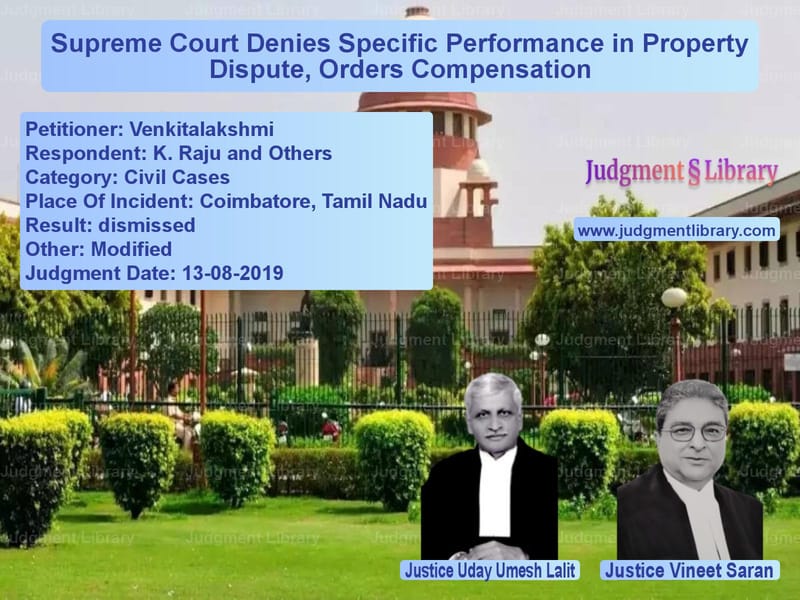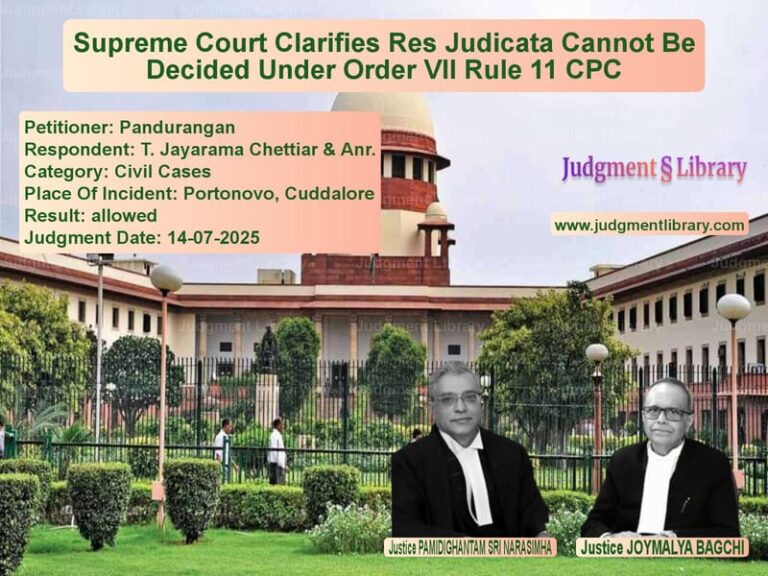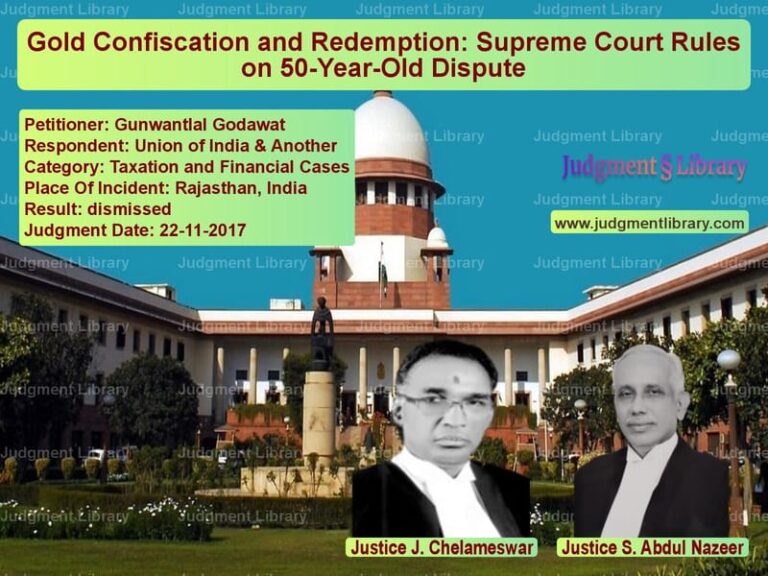Supreme Court Denies Specific Performance in Property Dispute, Orders Compensation
The case of Venkitalakshmi v. K. Raju & Others revolved around a long-standing property dispute concerning agreements of sale and the legal enforceability of specific performance. The case was brought before the Supreme Court of India after the High Court of Madras overturned the Trial Court’s decision in favor of the plaintiffs. The primary issue in contention was whether agreements dated July 16, 1980, were genuine and enforceable for the sale of land and whether the plaintiffs had demonstrated readiness and willingness to fulfill their contractual obligations.
Background of the Case
The dispute arose from two civil suits, O.S. No. 704 of 1981 and O.S. No. 707 of 1981, filed before the Principal Subordinate Court, Coimbatore, Tamil Nadu. These suits sought specific performance of agreements allegedly executed between the plaintiffs and the original property owners.
The plaintiffs contended that:
- The original defendants had agreed to sell the disputed property through agreements of sale on July 16, 1980.
- The agreed consideration was ₹1,19,500, with an advance payment of ₹5,000.
- Possession of a portion of the property was handed over as part performance of the agreement.
- The plaintiffs were willing to pay the remaining sale consideration but found that the defendants had sold the property to third parties.
The defendants, however, argued that they had an earlier agreement with a third party dated March 27, 1979, and that the plaintiffs had fabricated their agreements to interfere with the legitimate sale process.
Arguments by the Petitioner (Plaintiff)
The plaintiffs, represented by their legal counsel, argued that:
- The agreements dated July 16, 1980, were genuine and legally binding.
- The agreements were extended on multiple occasions with endorsements from the defendants.
- The plaintiffs were financially capable and ready to complete the sale but were prevented from doing so due to fraudulent transactions initiated by the defendants.
- The sale of the property to third parties was in violation of the doctrine of lis pendens (pending litigation) and should be declared null and void.
Arguments by the Respondents (Defendants)
The defendants countered these claims, asserting that:
- The agreements presented by the plaintiffs were fraudulent and created after the fact.
- The property had already been agreed to be sold in 1979 to another party, making the plaintiffs’ agreements invalid.
- The plaintiffs failed to prove their readiness and willingness to pay the remaining sale amount.
- The endorsements regarding time extensions were not genuine.
Key Observations by the Supreme Court
After reviewing the evidence and hearing arguments from both parties, the Supreme Court made several important observations:
- The High Court had correctly ruled that the plaintiffs failed to establish the authenticity of the agreements dated July 16, 1980.
- There was no convincing proof that the plaintiffs had the financial capability to complete the transaction.
- The trial court had erred in accepting the plaintiffs’ agreements as genuine while ignoring inconsistencies in the supporting evidence.
- The purported endorsements for extensions lacked credibility and could not be relied upon as valid proof of an extended contract timeline.
Supreme Court’s Ruling
The Supreme Court ruled against the plaintiffs, stating:
“Once the theory that time for completion of the transaction was extended gets demolished, the argument that there was readiness and willingness on the part of the Plaintiff also gets completely weakened. Thus, the conclusions arrived at by the High Court are not in any way incorrect to justify interference in jurisdiction under Article 136(1) of the Constitution.”
The Court emphasized that the plaintiffs failed to prove that the extension of time for fulfilling the agreement was legitimate. Furthermore, the absence of financial readiness meant they could not claim specific performance.
Compensation Instead of Specific Performance
Despite ruling against the plaintiffs, the Supreme Court acknowledged that they had made an initial advance payment. To ensure fairness, the Court directed:
“In the peculiar facts and circumstances of the present case, ends of justice would be met if the appellants are given some compensation over and above the return of the earnest money. We, therefore, direct the respondents to make over a sum of ₹5 lakhs in lieu of return of earnest money to the present appellants within eight weeks from today.”
Implications of the Judgment
This ruling has important legal implications:
- Reinforcement of contract enforcement rules: A party seeking specific performance must demonstrate both legal validity and financial readiness.
- Judicial skepticism toward retrospective modifications: Courts will not accept endorsements of contract extensions without convincing proof.
- Recognition of fairness: Even when specific performance is denied, courts may award compensation to prevent undue losses.
Conclusion
The Supreme Court’s decision in this case underscores the necessity of proving contractual authenticity and financial capability when seeking specific performance. While the plaintiffs did not succeed in enforcing the agreements, they were compensated for their initial payment, ensuring some level of equity. This ruling serves as a reminder that contract enforcement requires clear, unambiguous evidence and adherence to legal procedures.
Petitioner Name: Venkitalakshmi.Respondent Name: K. Raju and Others.Judgment By: Justice Uday Umesh Lalit, Justice Vineet Saran.Place Of Incident: Coimbatore, Tamil Nadu.Judgment Date: 13-08-2019.
Don’t miss out on the full details! Download the complete judgment in PDF format below and gain valuable insights instantly!
Download Judgment: Venkitalakshmi vs K. Raju and Others Supreme Court of India Judgment Dated 13-08-2019.pdf
Direct Downlaod Judgment: Direct downlaod this Judgment
See all petitions in Property Disputes
See all petitions in Specific Performance
See all petitions in Contract Disputes
See all petitions in Judgment by Uday Umesh Lalit
See all petitions in Judgment by Vineet Saran
See all petitions in dismissed
See all petitions in Modified
See all petitions in supreme court of India judgments August 2019
See all petitions in 2019 judgments
See all posts in Civil Cases Category
See all allowed petitions in Civil Cases Category
See all Dismissed petitions in Civil Cases Category
See all partially allowed petitions in Civil Cases Category







